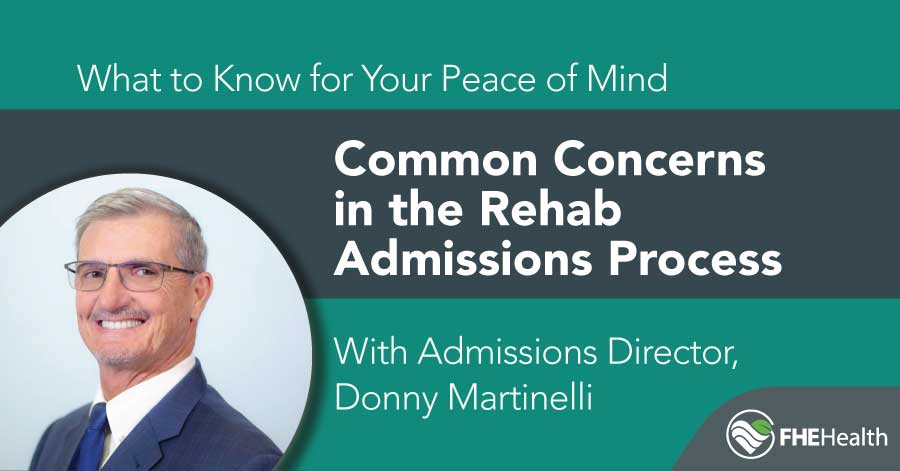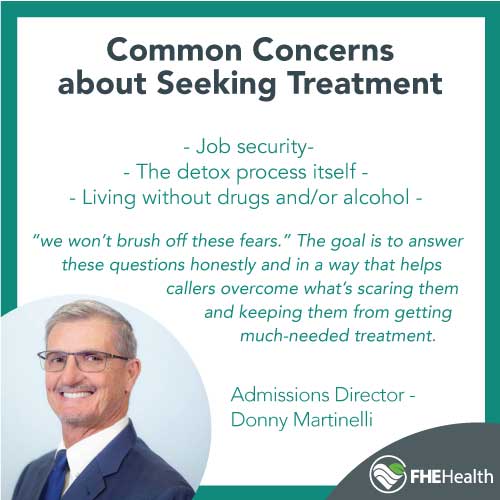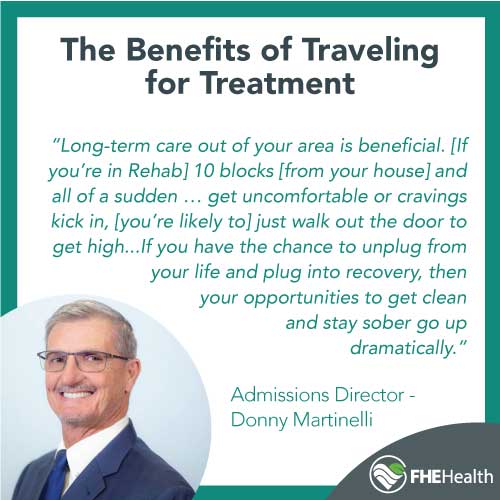
This article has been reviewed for accuracy by our peer review team which includes clinicians and medical professionals. Learn more about our peer review process.
This article featured Donny Martinelli, our former Director of Admissions. Meet Zack Traynor, our new Director of Admissions here!
When you have a drug or alcohol addiction or other mental health condition that is destroying your health and relationships and jeopardizing life itself, seeking treatment is always the very best thing you can do for yourself. This recovery journey usually begins with a simple phone call— in many cases to a prospective rehab provider. If they are a trustworthy facility, they’ll be transparent and upfront with you about their admissions process, providing guidance and support that ultimately is aimed at helping you access the treatment that best suits your unique needs (whether or not that treatment is at their facility or somewhere else).
Still, it’s only natural and normal to have questions and concerns about next steps in the admissions process. Most first-time callers, prospective patients and/or their family members, do. This article will demystify how the admissions process works, by addressing common questions and concerns among first-time callers and the steps between a first-time call and your arrival at the facility. Read more about the Signs of a Dangerous Rehab Center.
Nobody is more qualified to allay concerns about the admissions process and answer any questions than FHE Health Director of Admissions Donny Martinelli. He is among a small team of dedicated “admissions counselors” who work on-site at our facility answering calls 24/7. Like many on the admissions team, Martinelli has a firsthand understanding of addiction and a heart for helping others find recovery as he did.
Addressing 3 Biggest Fears in the Admissions Process
 In a recent interview, Martinelli described the most common fears he encounters when he’s on the phone with prospective patients. At the top of the list of prospective patients’ fears:
In a recent interview, Martinelli described the most common fears he encounters when he’s on the phone with prospective patients. At the top of the list of prospective patients’ fears:
- Job security (“If I take time off from work in order to do rehab, will I lose my job?”)
- The detox process itself (“Will I get sick and not be able to handle it?”)
- Living without drugs and/or alcohol (“How am I even going to manage daily life?”)
Martinelli said that in an effort to “build rapport,” “be compassionate and understanding with anyone who calls in,” and “meet callers where they are,” he and other counselors lets callers know that “we won’t brush off these fears.” The goal is to answer these questions honestly and in a way that helps callers overcome what’s scaring them and keeping them from getting much-needed treatment.
How, then, do admissions counselors allay the above common fears?
- Job security – When callers express job security fears, admissions counselors educate them on their right to get treatment under federal law and how to get a job-protected leave of absence under the terms of the Family Medical Leave Act (FMLA). In some cases, the Admissions team has gone to greater lengths. Recalling a real-life example of a patient whom his team helped, Martinelli said, “We actually guided them, worked with their HR department and got their short-term disability and FMLA paperwork completed.”
- The detox process – Martinelli and his team take an educational approach to this fear. They explain that “you’ll feel like you have a case of the severe flu,” but that their taper will be as safe and as comfortable as possible. Admissions counselors also educate callers about the fact that detox is a medically supervised withdrawal involving 24-hour nursing care and regular consultation with qualified doctors who oversee patients’ tapers. Martinelli said he also tells patients who are afraid of the process that their fear is “more psychological than anything” (meaning that actual withdrawal will not be that scary).
- Managing life without a substance – In response to the fear of being without a drug, Martinelli encourages his callers to look around and notice how many people aren’t using an addictive substance to cope. He also reminds them “there’s much more joy in life” than what they’re currently experiencing in addiction.
Other Common Questions and Concerns in the Admissions Process
 If job security, the detox process and life without a substance are prospective patients’ three biggest fears when they call our rehab facility, Martinelli said some questions and concerns come up a lot more frequently than others:
If job security, the detox process and life without a substance are prospective patients’ three biggest fears when they call our rehab facility, Martinelli said some questions and concerns come up a lot more frequently than others:
- Traveling for treatment – Out-of-state callers especially tend to have this concern. Here Martinelli cites research that shows “long-term care out of your area is beneficial.” He reminds callers that if they’re in rehab “10 blocks” from their house “and all of a sudden … get uncomfortable or cravings kick in,” they’ll likely “just walk out the door to get high.” Instead, “if you have the chance to unplug from your life and plug into recovery, then your opportunities to get clean and stay sober go up dramatically.”
- Concern about not being able to see one’s family while in rehab – To this, Martinelli brings up the sobering reality that not getting treatment will mean not having any family in one’s life for longer than the 30-plus days of a treatment program.
- “Am I going to have my own room?” – “The answer is ‘no,’ because it is clinically inappropriate to allow someone to isolate in a room alone.”
- “How long am I going to be there?” – The answer is “As long as you need. It’s really individualized and the longer you stay in treatment the higher the percentages are of remaining clean and sober. That said, we can’t dictate your life. We recommend they commit to a minimum of 30 days.”
- “How much will this cost?” – Martinelli said patients’ family members are more apt to ask this question. “We tell them up front what their deductible is and that they’re responsible for it.” Those who have financial concerns can also meet with our financial specialist, and our admissions counselors are happy to set up that meeting on their behalf.
From First Call to On-Campus Arrival – Steps in the Admissions Process
What happens in the admissions process, starting with that first call? Martinelli laid out the steps regarding what to expect. Check them out here. The process ends with a patient’s arrival and formal intake at our facility— and, often one of the first things they want to do is visit the admissions counselor who helped them get there.






